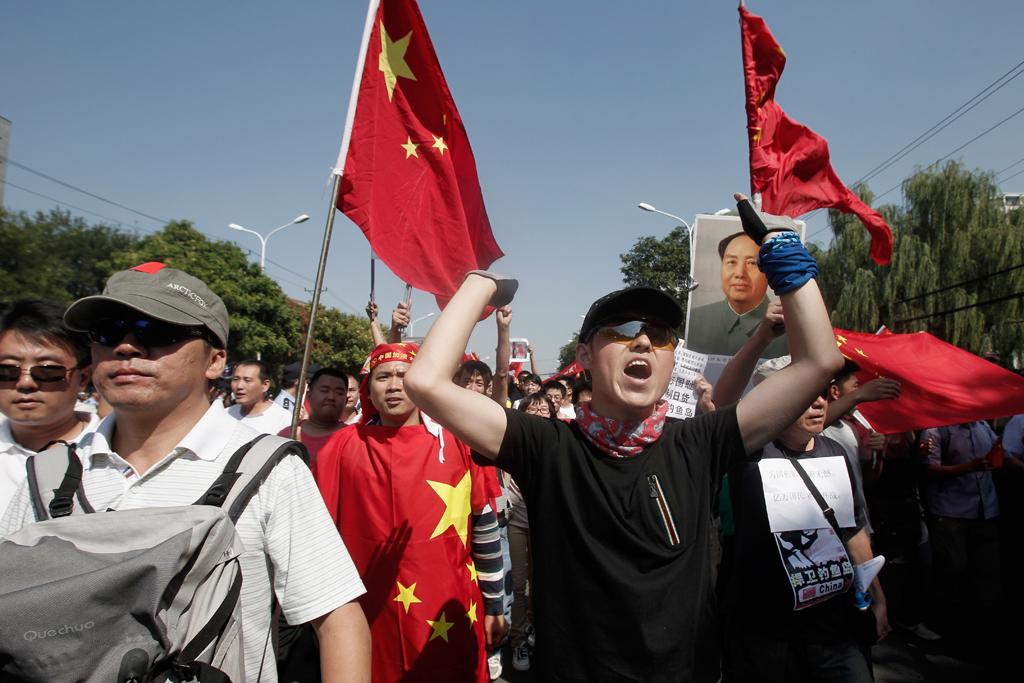Chinese insider: ‘China’s rise is not America’s demise’
Demonstrators hold flags and a portrait of Chairman Mao during an anti-Japanese protest over the Diaoyu Islands issue outside the Japanese Embassy on Sept. 15, 2012, in Beijing, China. Tensions in the area continue to simmer despite reports that China plans to remain ‘non-confrontational’ in its foreign policy dealings.
HONG KONG — China’s neighbors are scared of what it's capable of.
But despite Beijing’s warlike rhetoric in disputes with Japan and the Philippines, Dr. Ruan Zongze, one of China’s most influential foreign policy insiders, says China is “committed to peaceful resolution and peaceful dialogue.”
Ruan, 47, could be likened to a Zbigniew Brzezinski or John Kerry of China. He served for years as a high-ranking diplomat to the US at the Chinese Embassy in Washington, DC. (He recently published a memoir in Chinese on this period, “A Diplomat's Inside View of America.”)
Now as vice president of the China Institute of International Studies — the official think tank of China’s Foreign Ministry, the equivalent of the US State Department — he is one of the most important official voices steering China’s international affairs.
His remarks, delivered this week at a private lunch at the Foreign Correspondents’ Club in Hong Kong, spelled out Beijing’s perspective on relations with the United States and the rest of the world in the midst of uncommonly tense times.
“Critics fear China will become more and more assertive, while others accuse China of being too soft,” he said.
From a Chinese perspective, 2013 appears to bear similarities to 1913, he said. One century ago marked “the rise of the West, and the fall of the East.” Today, the opposite is happening, with money, power and influence flowing away from America and the West and into Asia.
He said, “It’s deja vu all over again” — except in reverse.
Alluding to tensions in the East China Sea, Ruan said that a rising right wing in Japan was to blame, but also singled out US President Barack Obama's "pivot" toward Asia for heightening tensions.
"America's pivot is sending the wrong message” to its allies, encouraging them to “become more bellicose and provocative,” he said. If Japan's aggression is unchecked, he warned, Japan could be a threat to territory all around the region.
“An unstable or weak China," he said, "would be very dangerous.”
Tensions have already reached worrying levels in the East China Sea this year. Chinese surveillance planes and ships have repeatedly approached the Senkaku/Diaoyu islands, which are administered by Japan. Japan scrambled jets in response.
When Secretary of State Hillary Clinton said America opposed “any unilateral actions that would seek to undermine Japanese administration” of the islands, Chinese media erupted in anger. (The US does not, however, have a position in the sovereignty dispute.)
Rhetoric from military figures has become particularly splenetic. One Chinese general declared last week that "the Chinese military could win a war over the Diaoyu islands in half an hour." This week, Col. Liu Mingfu of China urged Australia to distance itself from the US and Japan, saying "America is the global tiger and Japan is Asia's wolf, and both are now madly biting China."
Online, nationalism is even more strident. One Chinese web user mocked the “Japanese dogs [who] once again go to their daddy for support.” In Japan, commenters joked “Now that the US is really involved, China is scared out of its mind,” according to a translation by Tea Leaf Nation, an online magazine about China.
Remarking on the United States, Ruan said Beijing has no reason or desire for conflict with America.
"We do not want a zero-sum game," he said. "We don’t want to say that China’s rise is the demise of the United States.”
Ruan also addressed concerns about China’s military buildup, which has soared to nearly $200 billion, second only to the United States. The People's Liberation Army recently rolled out a new aircraft carrier to much fanfare, adding to a growing arsenal of warships and fighter jets. General Secretary Xi Jinping (who is also the head of the military) last week ordered the 2.3 million-strong People's Liberation Army to enhance their combat readiness.
But the aim of this expansion, Ruan claims, is simply to bring the military in line with China's greater wealth and its desire for self-defense. He listed several purposes for China’s military, including protecting overseas Chinese personnel (such as those in Africa), fighting Somali piracy and defending China's borders.
“We’ve got to have a stronger and more capable military,” he said.
Yet despite Ruan's irenic assurances, his parallel of 2013 to 1913 also has an ominous, if unintentional, implication: the prelude to war. World War I erupted in 1914. As Charles Emmerson, a senior research fellow at Catham House, argued in a recent analysis, 1913 was indeed similar to our times in ways that should make us extra vigilant against bloodshed:
“In many ways, the world of 1913, the last year before the Great War, seems not so much the world of 100 years ago as the world of today, curiously refracted through time," he wrote.
“The world of 1913 — brilliant, dynamic, interdependent — offers a warning. The operating system of the world in that year was taken by many for granted. In 2013, at a time of similar global flux, the biggest mistake we could possibly make is to assume that the operating system of our own world will continue indefinitely, that all we need to do is stroll into the future, and that the future will inevitably be what we want it to be.”
Every day, reporters and producers at The World are hard at work bringing you human-centered news from across the globe. But we can’t do it without you. We need your support to ensure we can continue this work for another year.
Make a gift today, and you’ll help us unlock a matching gift of $67,000!
